This weekend, the Columbia New Opera Workshop is presenting John Eccles’s opera The Judgement of Paris. Bwog writer (and, more recently, potential opera enthusiast) Betsy Ladyzhets had the honor of attending rehearsal this past Monday, and talked to members of the cast about what makes this production unique and about why opera is still relevant in the era of Hamilton.
I saw an opera at the Met with my parents once, years ago. At that time opera seemed to me an impressive but antiquated form of theater: the costumes were enormous, the set was elaborate, and the style of singing was unlike anything I’d heard before. The music was beautiful, yes, but, were it not for the subtitles conveniently projected onto the seat in front of me, I would have had no idea what any of the actors were saying.
The experience I had at New Opera Workshop (NOW) rehearsal I attended on Monday was completely different. The cast and crew members I talked to were other students, not faraway actors two tiers below me, and the show they were rehearsing – The Judgement of Paris, a British opera written in the early eighteenth century – was engaging and funny, not antiquated in the slightest.
NOW was founded two years ago, and The Judgement of Paris is only the group’s second full production. They started out with doing just repertoire scenes, then moved into longer operas after gaining more members (and a larger budget.) They’re hoping to expand into more full-length operas; this is difficult because the traditional show schedule at Columbia doesn’t allow groups as much time as NOW would need to put on a two hour show. Still, through planning ahead and dedicated rehearsals, the current board is optimistic that they can continue expanding their repertoire.
The Judgement of Paris tells the story of the Greek and Roman myth of the same name. Eros, the goddess of discord, instigates a contest between Juno (goddess of the state), Venus (goddess of love), and the Pallas Athena (goddess of wisdom) by declaring that a golden apple inscribed “for the fairest” should be presented to one of the three. In the opera, the apple is delivered by Mercury, who calls upon the shepherd boy Paris to make the difficult decision. Each goddess bribes him: Juno with vast territory, Pallas with victory in war, and Venus with the most beautiful world (Helen of Sparta) for his bride. Spoiler alert: Venus wins, and Paris’ seizure of Helen becomes the mythical instigation for the Trojan War.
This operatic retelling was first written in 1700, then set to music by four different British Baroque composers as part of a competition held in 1701. The contest was intended to promote British opera music, and, as such, the opera is written in English. Stepan Atamian, CC ‘16, Masquerader in The Judgement of Paris and Artistic Director of NOW, called it “a score meant for the English language in a way that few others had done before.” It’s also more streamlined than many previous English operas (which were heavily inspired by their French and Italian counterparts); this opera is only one hour long.
“What’s cool about these baroque operas is that there really isn’t much of a performance history,” Stepan told me. In fact, although the opera was written over three hundred years ago, the first recording of its music wasn’t released until a couple of years ago. This left NOW a lot of room for interpretation – and interpret they have. Their performance features Chloe Walton, CC ‘16 as Paris, and Angela Scorese, BC ‘16 as a Mercury with what she called a “Tinkerbell vibe.” These changes were originally made because of a lack of men in the group (a couple of cast members jokingly asked that I include a “call for penis” in this article), but they present an interesting twist on an old myth. In addition, the Staging Director, Hannah Rose Gorman, CC ’16, and cast members have made acting and staging choices that bring out the humor in the musical, making it more fun and engaging for the audience.
Angela explained that a large principle of baroque and classical style is “finding variety within unity,” or making repetitive motifs in the music different each time they appear. “It’s predictable, but the music makes it worth watching,” she said.
Another notable aspect of the music for this show is its accompaniment; NOW has employed a ten piece orchestra for The Judgement of Paris, including all four string instruments, oboe, flute, keyboard, and no less than three trumpets. According to Stepan, the original opera is rumored to have been scored for an eighty five-piece orchestra, but even ten is large for a black box show – there are more musicians than cast members. It will be a challenge for this orchestra, conducted by Ricardo Bustamante, GS ‘17, to play beneath the (unmiked) singers, but the instrumentation lends a fuller, more diverse sound to the show. I attended part of an orchestra rehearsal on Monday, and was impressed by the technique and expression with which the musicians practiced a complex, difficult baroque score. They, like the singers, are able to find “variety within unity.”
The actors themselves expressed enthusiasm about the music of the show, as well as the process of working on it. One of NOW’s main principles as a group is giving everyone involved a good part and opportunities to improve; it’s why they chose a smaller show with a variety of interesting roles. The actors have a lot of input into every detail of their roles, and the process of the show is very much a collaborative effort. At rehearsal on Monday, I watched actors help paint props (Angela was painting the golden apple while I interviewed her) and crew members give input into costumes. Caroline Laporte-Burnes, BC ‘18, the show’s costume designer and a Masquerader, even asked me for my opinion a couple of times.
“I like the collaborative aspect to [the show],” Chloe said. “It’s like working with peers, not necessarily like working with a hierarchy.”
I asked all of the cast members, many of whom are seniors who have been with the group since soon after its founding, why they chose to join NOW. The responses were all fairly similar: all of them wanted to gain more experience with opera, and felt that opera would be more fun and rewarding than other types of theater. Surprised at their love for what I’d previously thought was stuffy and boring, I pressed further.
“[Opera] is the ultimate art form,” Esther Adams, BC ‘16 and Juno in the production, told me, only slightly jokingly. She explained that opera combines music, theater, dance, and the culture and politics of a certain time. Other members of the cast elaborated, discussing how opera encompasses over four hundred years of music, yet retains a specific style and a very high level of performance.
“With opera, there’s a certain rigor that doesn’t exist in theater,” Stepan said. He told me about how, in high school, he started going to Lincoln Center more often than to Broadway – at first because opera tickets were less expensive, but then because he fell in love with the art form. He described how incredible it was to be able to hear an unmiked pianissimo from the back of the stage, three hundred feet away, as easily as a fortissimo. Opera doesn’t rely at all upon microphones, forcing its singers to really project – only one of the ways in which these performers are held to a high standard.
Although many NOW members prefer opera to musical theater, they admit that it is growing more and more difficult to distinguish between the two forms. Some musicals are very operatic (such as Sweeney Todd and Les Miserables), and some operas are very much like musicals (Stepan named The Magic Flute as an example.) The main differences during rehearsals are that operas tend to be more particular about conveying lyrics accurately to the audience, especially when the work is in another language, and that opera singers are expected to know their parts very well before they even begin rehearsal. Opera requires more vigor and less error. However, that doesn’t mean it can’t be fun.
“Opera is a totally different experience every time – it never gets old,” Isabel Springer, BC ‘18 and the Pallas Athena in the show, explained. The New Opera Workshop’s production of The Judgement of Paris promises to be anything but old, and the group proves that opera as a theater form is far from antiquated – it’s making new advances, especially at Columbia.
The Judgement of Paris plays tonight and tomorrow at 8pm and Saturday at 3pm in the Glicker-Milstein theater. Tickets are free with CUID and $10 without.
- Paris, making some difficult decisions
- Juno looks terrifying, but that dress is incredible
- Athena is ready to kill a man (she definitely belongs at Barnard)
- Mercury with “a Tinkerbell vibe”
- Award Venus the apple or let Paris live? Vote Now On Your Phones
- Orchestra doing its orchestra thing
Tech rehearsal photos via Katharine Lin, CC ’16


 2 Comments
2 Comments
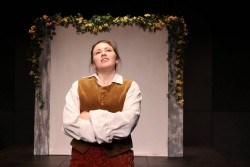
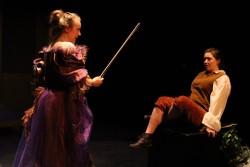
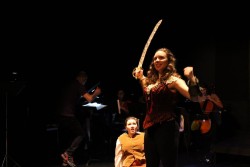
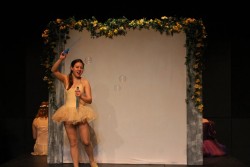
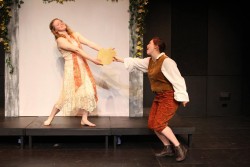
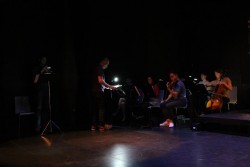

2 Comments
@ghostofspec If only CU Spectator could do articles on the arts like this. Fantastic piece. Just bought a ticket for the opera. It looks great!
@Kaitlin Awesome article Betsy!!